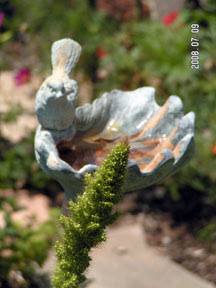Juvenal, Satire X
 This blog is not so much about my garden, as about things I learn there. Like: the world is round, and I am pear-shaped. Like: how the French expression equivalent to calling a spade a spade is “appeler un chat un chat”. Calling a cat a cat.
This blog is not so much about my garden, as about things I learn there. Like: the world is round, and I am pear-shaped. Like: how the French expression equivalent to calling a spade a spade is “appeler un chat un chat”. Calling a cat a cat.My pear shape prevents my thoughts from fitting into tidy squared-off compartments of thought. There are times when I can squeeze through the convoluted corridors of memory and access certain areas inside my own head, the richer veins of contemplation, the quiet peaceful aisles where memories are stored in sweet soft pillows rather than tidy file cabinets. I try to fit in as much as I can as long as I can, then I have to squeeze beneath the overturned cup like the octopus in the laboratory; to wriggle beneath the curvy ropes of my coiled brain, and slip out into the sea, expanding and rocking beneath the moon above and deep currents below.
 That’s not say that I have a disorderly mind; that my ideas, inspirations and recollections sprawl inside my head with their limbs entangled; or that they’re like lint clogging the corners of god’s laundry room. Tangled among the tight convolutions of my brain, thoughts that rub up against each other chaotically, randomly, like tossing a deck of cards on the bed and then bouncing on it.
That’s not say that I have a disorderly mind; that my ideas, inspirations and recollections sprawl inside my head with their limbs entangled; or that they’re like lint clogging the corners of god’s laundry room. Tangled among the tight convolutions of my brain, thoughts that rub up against each other chaotically, randomly, like tossing a deck of cards on the bed and then bouncing on it. I remember rolling down a short grassy hill, smelling like summer clover and honeysuckle. I remember that my body then was small and quick, unencumbered by pain. I remember it so clearly.
Relying on your own eloquence to escape death, Juvenal says to me, can be just as futile as relying on your strength. So I’ll shut up. I’m off to sit on the porch with un chat, and remember.





















